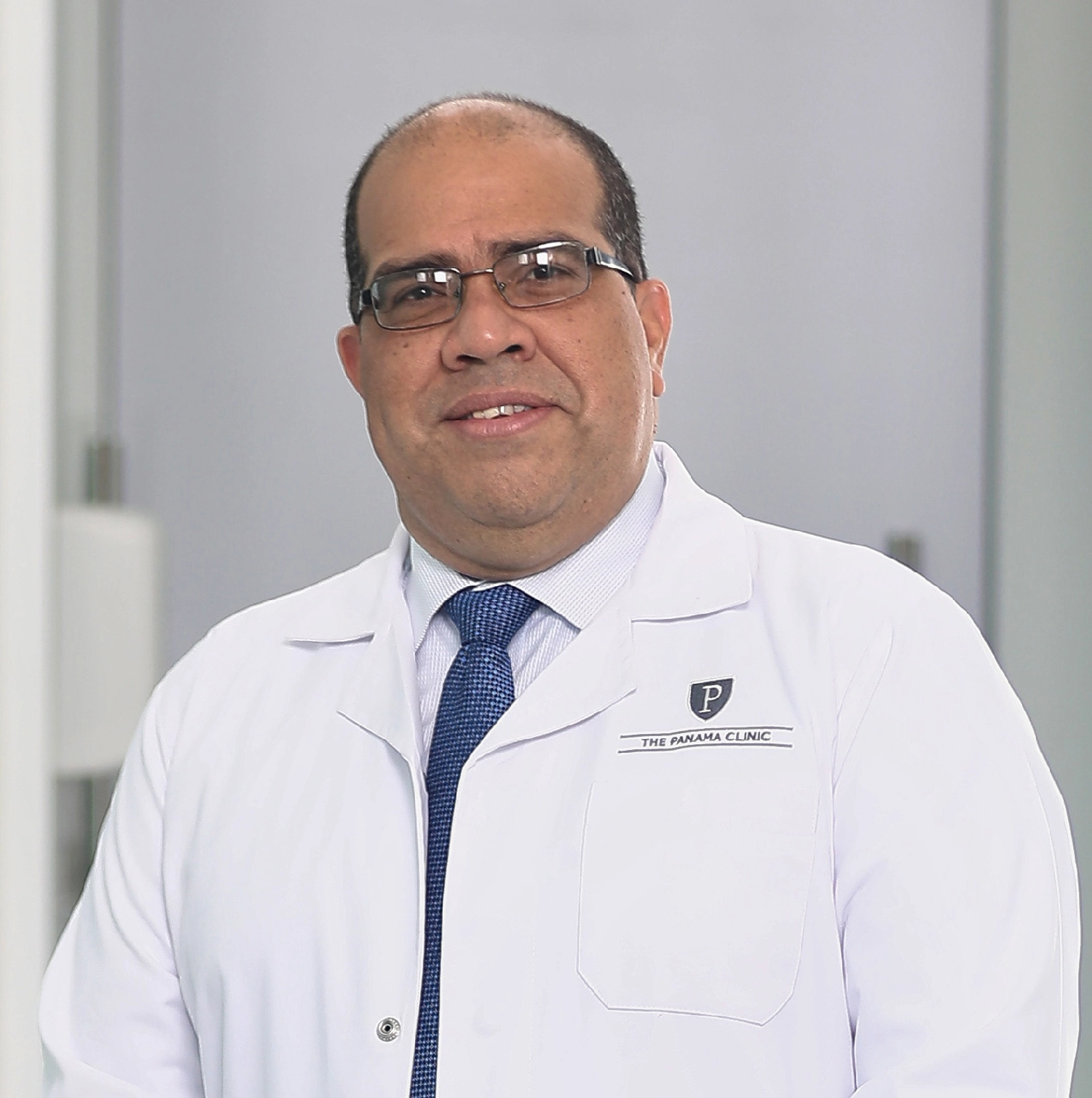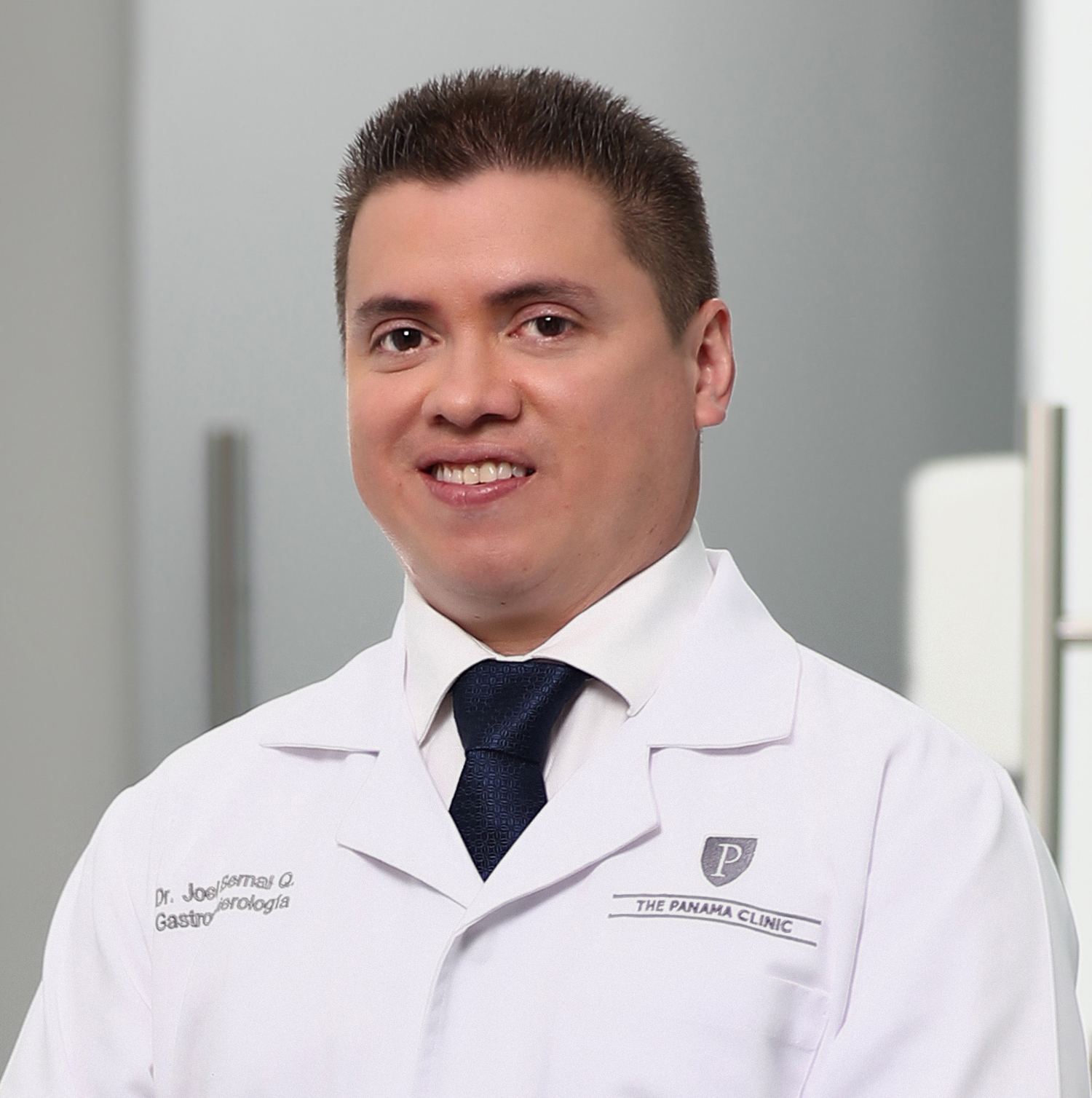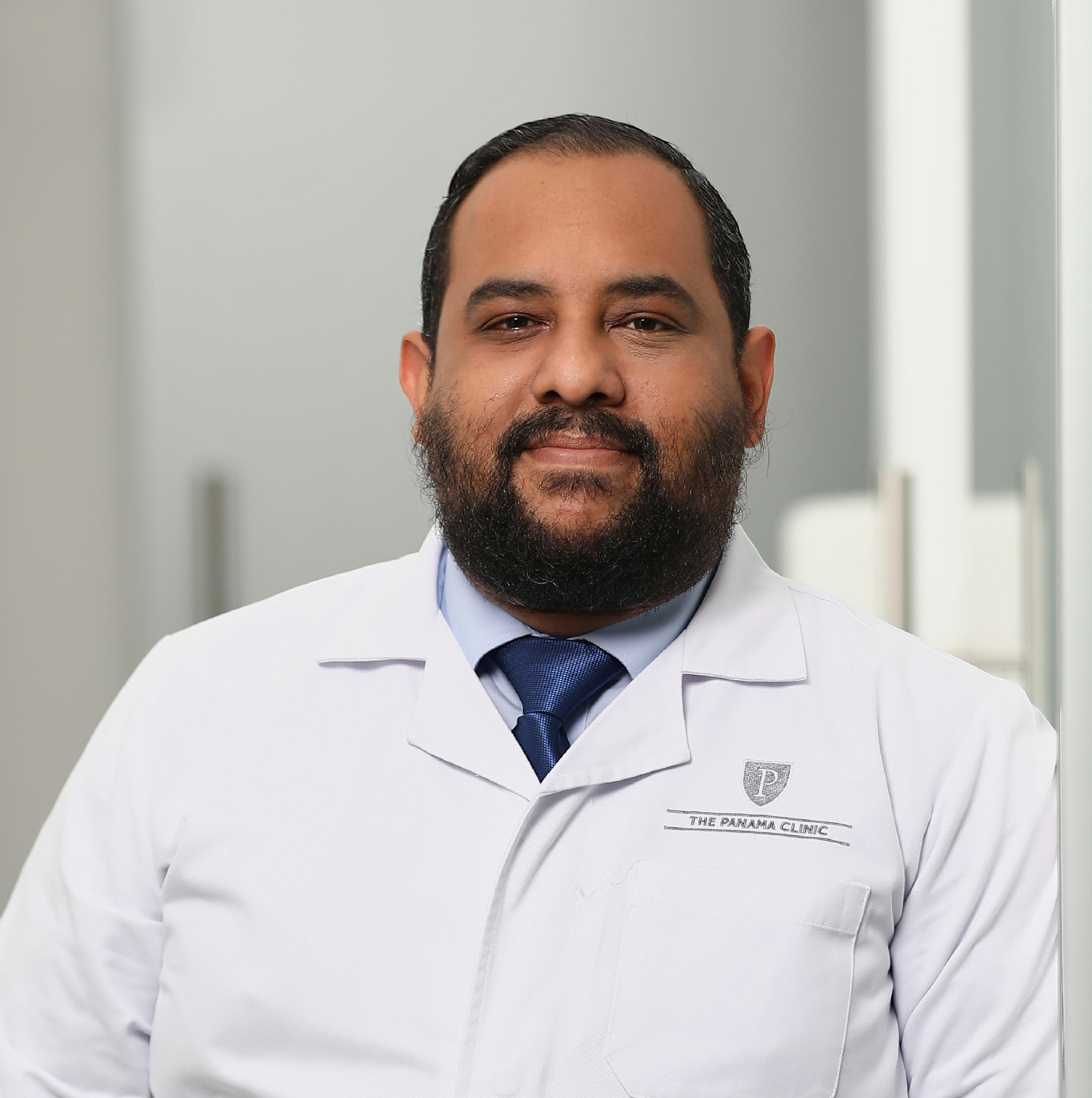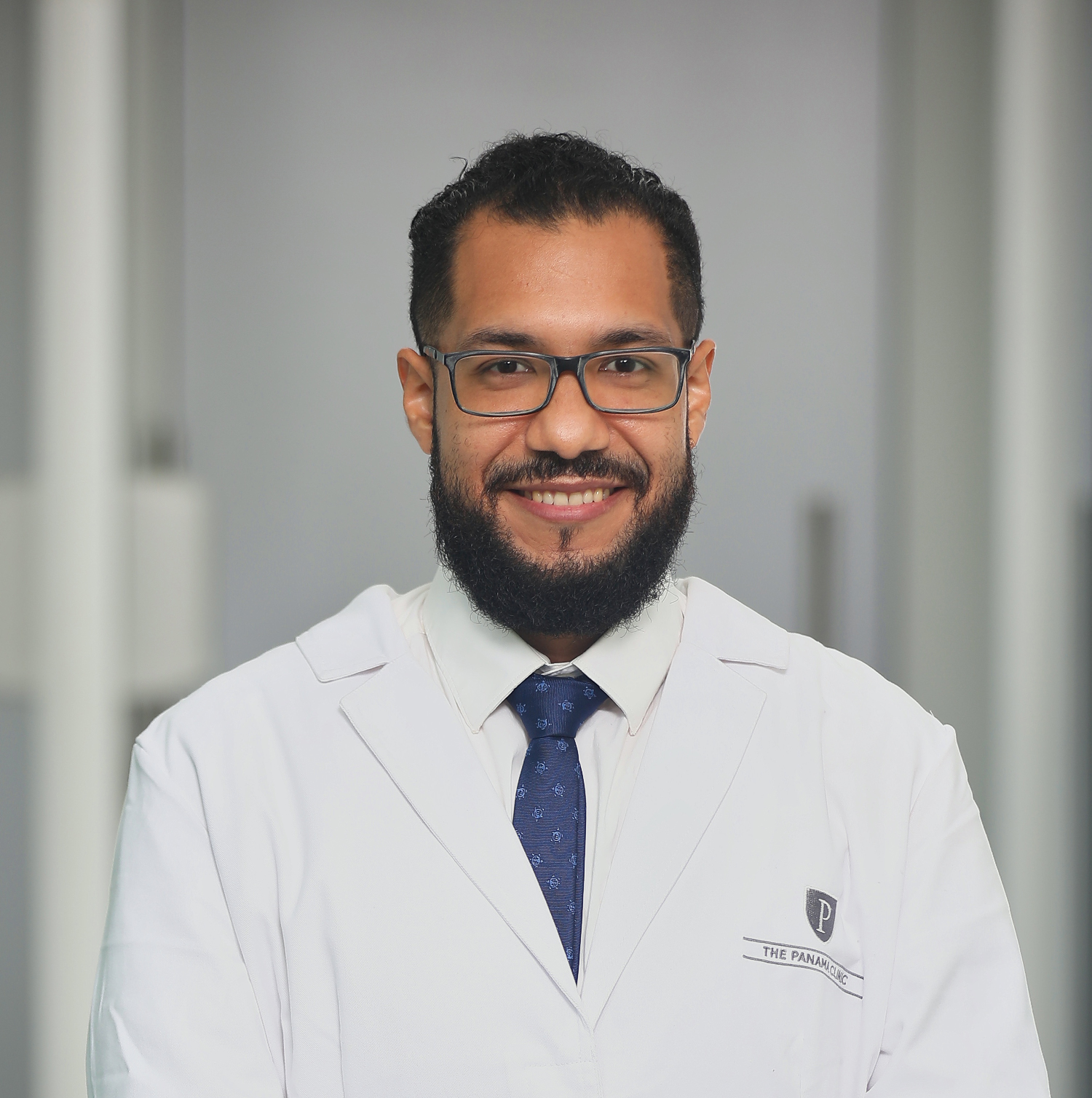Stomach Cancer
Timely medical evaluation linked to the right treatment methods are the best way to fight stomach cancer; in the hands of our professionals your chances of survival are much higher.
We understand each of your oncological needs.
Our multidisciplinary team is focused on advising and guiding patients in their fight against stomach cancer. In addition, we provide you with all the tools, tests and equipment in the same place, providing you with a comprehensive medical experience.

Statistics indicate that 1 out of every 96 men is at risk for stomach cancer. On the other hand, women have a lower probability, with 1 positive case for every 152 women.

Stomach cancer is usually removed surgically, in order to eliminate from the root the area where the abnormal cells are concentrated.
Diagnosis and Staging
From the initial clinical stage, we will start with the planning of a favorable treatment scheme for your recovery.

General Welfare
At Panama Cancer Clinic we want to make a positive impact on our patients; for this reason, we provide a diagnostic and therapeutic approach that allows us to achieve a balance between the physical and the emotional.
The Specialist
Physicians and surgical oncologists cooperate continuously to evaluate, treat and intervene in a timely manner, the pathologies associated with stomach cancer.
What is stomach cancer?
It is a disease that derives from changes in the DNA of the cells of the stomach; these cells may be located either in the main body of the stomach or in the area where the gastroesophageal junction occurs.
The importance of the proper functioning of this organ stands out at first sight, since the stomach is in charge of receiving, processing and breaking down the food consumed.
Types of stomach cancer
Among the most common types of gastric cancer prevail:
Adenocarcinoma:
About 90% of gastric cancers are of this type. This cancer originates specifically in the internal mucosa of the stomach.
Lymphoma:
These malignant tumors of the immune system are occasionally detected in the stomach wall. Evaluating the characteristics of the tumor is fundamental to choose the treatment method to implement.
Gastrointestinal stromal tumor:
Although they do not appear very often, these tumors, which can be malignant or benign, tend to develop mainly in the walls of the stomach.
Carcinoid tumor:
This type of neuroendocrine tumor arises and multiplies thanks to hormone-producing cells.
Other less recurrent types of stomach cancer are squamous cell carcinoma, leiomyosarcoma and small cell carcinoma.
Common Symptoms of Stomach Cancer
Stomach cancer may cause several symptoms at first. These symptoms may resemble other, less serious problems. It is important to notice any changes in your digestive health and seek medical help if you notice anything unusual.
Loss of appetite
A loss of appetite is a common symptom. You may feel full quickly after eating little. This can lead to unintentional weight loss.
Persistent abdominal pain
Abdominal pain that does not go away is another symptom. This pain may be felt in the upper abdomen. It is often thought to be indigestion or heartburn, but it may be cancer.
Nausea and vomiting
Nausea and vomiting may be signs of stomach cancer. If these symptoms do not go away or get worse, it is time to see a doctor.
Changes in stool
Stomach cancer can change how you feel in your intestine. You may see dark or bloody stools. This may be a sign of bleeding in your stomach. Also, you may feel tired and weak from anemia.
If you notice one or more of these symptoms, don't think you have cancer. But if they continue or worsen, it's vital to talk to a doctor. Early diagnosis is key to effective treatment. Your doctor can run tests to find out what's wrong and how to treat it.
Advanced Symptoms of Stomach Cancer
Stomach cancer can cause more serious symptoms as it progresses. It is vital to be alert to these signs. If symptoms last longer than two weeks, seek immediate medical help.
Unexplained weight loss
Significant weight loss without effort may be a sign of stomach cancer. More than half of patients with this cancer lose weight before they are diagnosed.
Fatigue and weakness
Fatigue and weakness are common in advanced stages. These symptoms may be caused by anemia or effects of treatment. Anemia occurs when the tumor slowly bleeds into the stomach.
Difficulty swallowing
Difficulty swallowing or feeling that food is stuck is an advanced symptom. This problem, called dysphagia, occurs when the tumor blocks the passage of food. If the difficulty in swallowing lasts more than two weeks, it is crucial to consult a physician.
Ascites and abdominal distention
Advanced cancer can cause ascites, fluid accumulation in the abdomen. This leads to abdominal swelling and distention. Ascites also causes pain and discomfort. If you notice persistent swelling, seek medical evaluation.
Other advanced symptoms include jaundice, which is a yellowing of the eyes and skin. This may indicate that the cancer has spread to the liver. Persistent vomiting is also common in advanced stages. It is crucial to detect and treat stomach cancer early for the best chance of recovery. If you experience these symptoms, don't ignore them. Talk to your doctor for proper diagnosis and treatment.
Contact us at
Schedule an appointment
Request a consultation

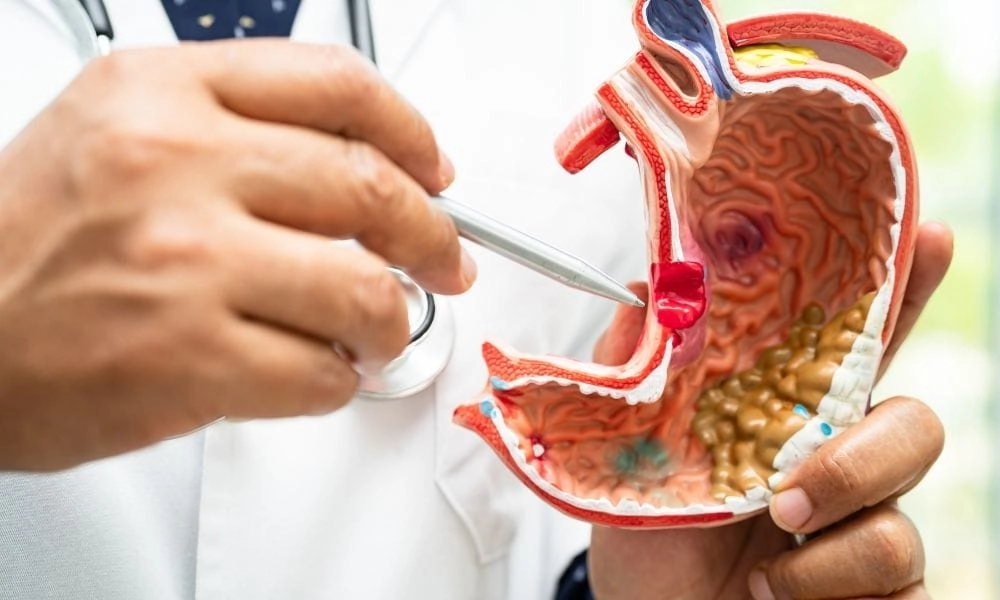
Risk Factors
The risk of developing stomach cancer increases when a person meets some of the factors on this list:
Have some time suffering from gastric diseases such as: polyps or gastritis.
It has a diet high in sodium and smoked products.
He suffers from obesity.
Smokes.
Maintains a low consumption of natural foods (fruits, vegetables and greens).
Has a family history of gastric cancer.
Your stomach has been infected by Helicobacter pylori bacteria.
Screening tests
How to prevent colon cancer?
Normally, people go to the doctor when they begin to notice symptoms of a problem affecting their gastrointestinal function. To really detect what pathology is present; the doctor must evaluate the patient's medical history and physical condition, palpating the abdominal area in search of changes.
If during this examination your doctor discovers signs that raise suspicion of cancer or another stomach condition, he or she may recommend some more advanced diagnostic tests, including:
Biopsy + Endoscopy
Ultrasounds.
Imaging studies: CT scans, MRI scans, X-rays, etc.
Blood count.
Laparoscopy is another study that can be used after stomach cancer has been detected; it is possible to explore the external part of the stomach and find small tumors, which due to their tiny appearance could have gone unnoticed with the previous techniques.
Stomach cancer treatments
The approach to your treatment will depend on the specific characteristics of your disease, taking into consideration: your state of health, the exact location of the cancer within the stomach sac, the current stage and how aggressive it is.
These are the main treatment methods for stomach cancer:
Surgery:
The purpose of this procedure is to cut and remove the cancerous portion, as well as a small border of healthy tissue around it. In very advanced cases, a total gastrectomy may be performed; removing the stomach and directly joining the esophagus to the small intestine.
The subject of surgical procedures for stomach cancer is broader than one might think; with surgery it is not only possible to remove the affected portion of tissue, but it can also be used palliatively to control (or at least alleviate) the strongest symptoms. Operations for gastric cancer are mainly subdivided into: endoscopic resection, subtotal or partial gastrectomy, total gastrectomy, lymph node removal and feeding tube implantation.
Chemotherapy:
Treatment consists of administering oral or intravenous medications, which pass through the bloodstream until they reach the area affected by the stomach cancer to destroy it.
Targeted therapy:
Targeted therapy drugs target the most vulnerable parts of the cancer in a new way. It should be noted that these areas are not targeted in traditional chemotherapy.
Immunotherapy:
The specialist provides drugs that allow the patient's own immune system to fight the cancerous cells that deteriorate the patient's health.
Radiotherapy:
In radiation, special techniques are used to precisely target the affected area of the body, thus eliminating any malignant cells within it.
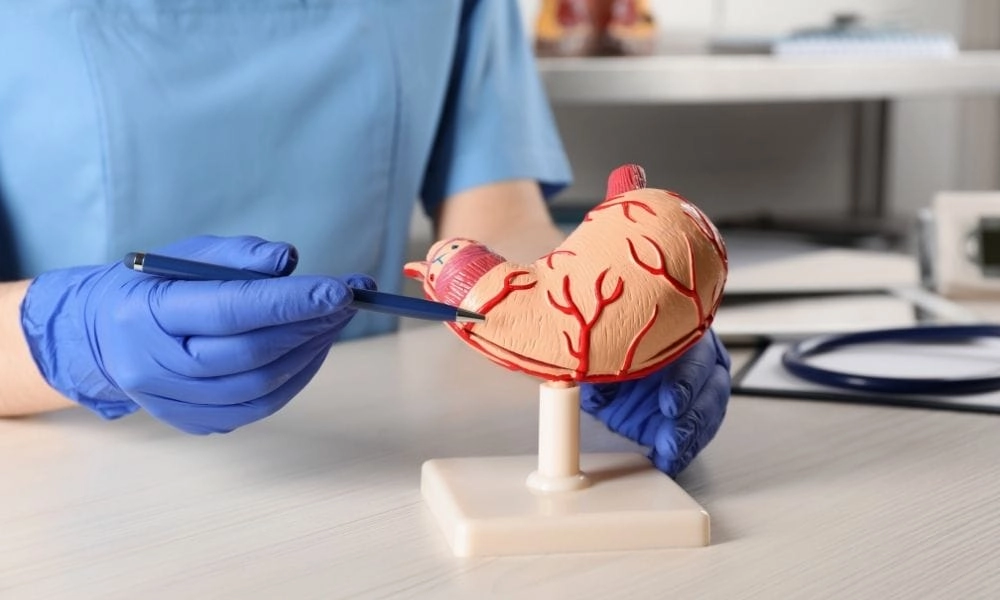
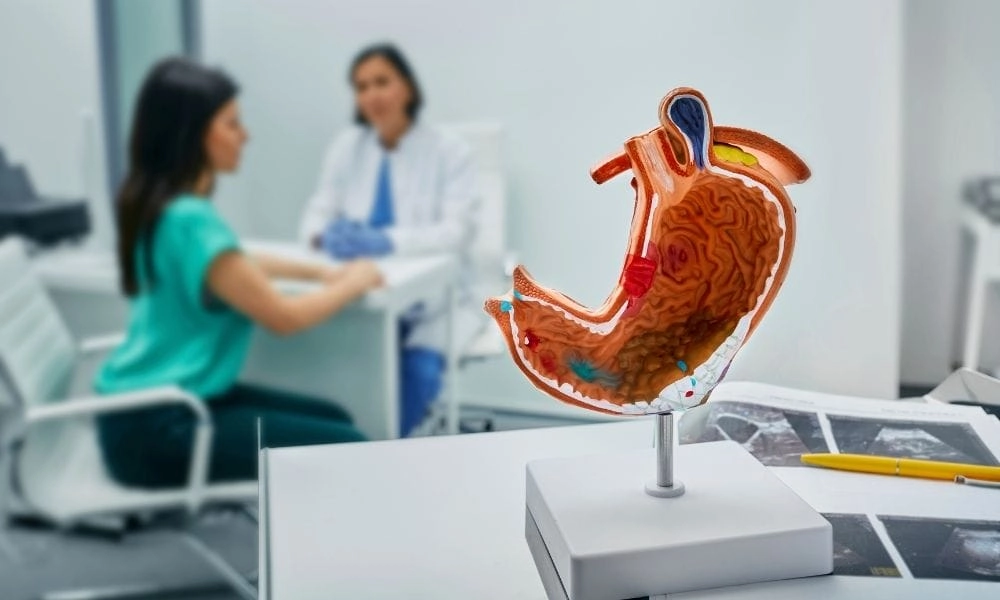
Prevention
How to prevent stomach cancer?
If you want to reduce the chances of going through this disease it is recommended:
Maintain a healthy weight and avoid becoming overweight.
Add more fruits, vegetables and greens to your daily diet.
Decrease the amount of ultra-processed foods.
Reduce sodium intake.
Quitting cigarettes and tobacco in general.
Check your family's medical history.
Act in time to any suspicion.
Complications
In addition to the side effects derived from each treatment; the patient may also suffer from certain subsequent complications, for example:
Abdominal swelling due to fluid retention.
Experience gastrointestinal bleeding.
Losing weight.
Relapse back into the disease or metastasis.

